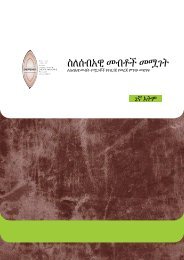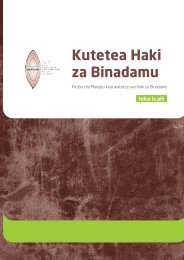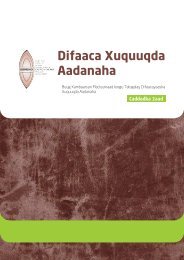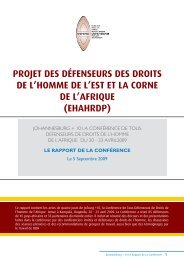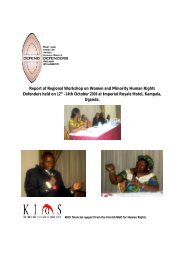English PDF - East and Horn of Africa Human Rights Defenders ...
English PDF - East and Horn of Africa Human Rights Defenders ...
English PDF - East and Horn of Africa Human Rights Defenders ...
You also want an ePaper? Increase the reach of your titles
YUMPU automatically turns print PDFs into web optimized ePapers that Google loves.
Conference Report: Resources <strong>and</strong> Proceedings 19Kenya Television Network (KTN) became the first private TV station in Kenya when it wasallowed to broadcast in Nairobi in 1989. It is owned by the group, which runs The St<strong>and</strong>ardnewspaper.Citizen TV is owned by business magnate Samuel Macharia.Recent developments <strong>and</strong> the media todayThere is still evidence <strong>of</strong> huge Government interest in regulating the media rather than promotingmedia self-regulation in line with more freedom <strong>of</strong> the press as was expected with the election <strong>of</strong>the present NARC (National Rainbow Coalition) Government in December 2002.Instead, there is a range <strong>of</strong> civil <strong>and</strong> criminal law statutes that supplement the constitution inseverely limiting the freedom <strong>of</strong> the press as guaranteed in section 79(1) <strong>of</strong> the current KenyanConstitution. These include:• The Penal Code, Cap 63,• Official Secrets Act Cap 187,• Defamation Act Cap, 36,• Preservation <strong>of</strong> Public Security Act cap, 57,• Public Order Act Cap 56,• Books <strong>and</strong> Newspapers Act, Cap 111,• Films <strong>and</strong> Stage Plays Act, cap222, Copyright Act, Cap 130,• Chief’s Authority Act, Cap 84,• Police Act. Cap 84 <strong>and</strong>• The Armed Forces Act, cap 1999Factors influencing media performance in Kenya are associated with political interference,patronage <strong>and</strong> bribery <strong>of</strong> journalists by certain powerful individuals.The Government in 1993 established a Task Force on Press Law to make recommendations for acomprehensive legal framework for the exercise <strong>of</strong> the freedom <strong>of</strong> the press <strong>and</strong> the development<strong>of</strong> dynamic <strong>and</strong> responsible print <strong>and</strong> broadcast. While the Task Force was still collecting views,the then minister for Information <strong>and</strong> Broadcasting announced that the Government hadcompleted a Press Council Bill.Indeed in 1995, information leaked to media that the Kenya Mass Media Commission Bill (1995)<strong>and</strong> the Press Council Bill (1995) were to be tabled in Parliament by the Attorney General <strong>and</strong>they were hastily withdrawn.The Task Force submitted its report to the Attorney General in 1998 but it is yet to be acted on.The Kenya Union <strong>of</strong> Journalists <strong>and</strong> the Media Steering Committee also presented media bills tothe AG but no action has been taken so far.The most important benchmark for evaluating media freedom in a country is Article 19 <strong>of</strong> theInternational Convention on Civil <strong>and</strong> Political <strong>Rights</strong> but in contrast to the convention, theKenya Constitution falls short <strong>of</strong> the st<strong>and</strong>ards not only with regard to providing for the right toreceive <strong>and</strong> impart ideas <strong>of</strong> all kinds <strong>and</strong> protecting it, but more in terms <strong>of</strong> recognizing the rights<strong>of</strong> media organizations. This is made worse by the provisions <strong>of</strong> the Official Secrets Act whichseverely limits the extent to which the media <strong>and</strong> the general public may access <strong>and</strong> publishinformation in relation to the Government.



